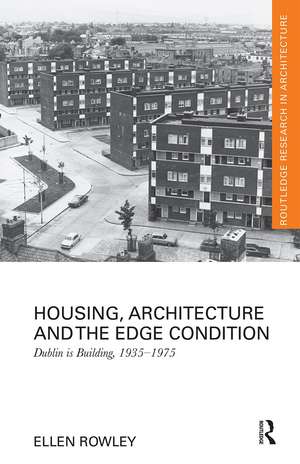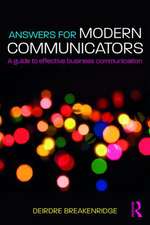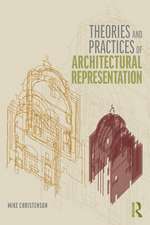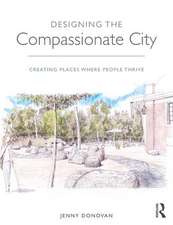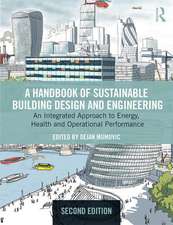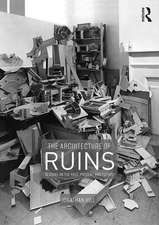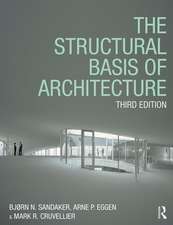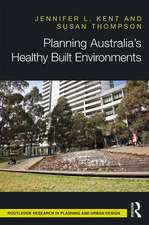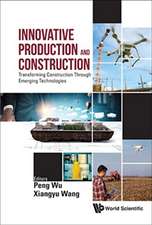Housing, Architecture and the Edge Condition: Dublin is building, 1935 - 1975: Routledge Research in Architecture
Autor Ellen Rowleyen Limba Engleză Paperback – 30 sep 2020
Critically, the book tackles this housing history as an architectural and design narrative. It explores the role of the architectural community in this frenzied provision of housing for the populace. Richly illustrated with architectural drawings and photographs from contemporary journals and the private archives of Dublin-based architectural practices, this book will appeal to academics and researchers interested in the conditions surrounding Dublin’s housing history.
| Toate formatele și edițiile | Preț | Express |
|---|---|---|
| Paperback (1) | 273.44 lei 6-8 săpt. | |
| Taylor & Francis – 30 sep 2020 | 273.44 lei 6-8 săpt. | |
| Hardback (1) | 768.12 lei 6-8 săpt. | |
| Taylor & Francis – 27 noi 2018 | 768.12 lei 6-8 săpt. |
Din seria Routledge Research in Architecture
- 9%
 Preț: 1004.48 lei
Preț: 1004.48 lei -
 Preț: 312.22 lei
Preț: 312.22 lei - 9%
 Preț: 866.91 lei
Preț: 866.91 lei -
 Preț: 351.26 lei
Preț: 351.26 lei -
 Preț: 312.44 lei
Preț: 312.44 lei -
 Preț: 311.48 lei
Preț: 311.48 lei -
 Preț: 310.45 lei
Preț: 310.45 lei -
 Preț: 309.89 lei
Preț: 309.89 lei - 9%
 Preț: 866.04 lei
Preț: 866.04 lei - 9%
 Preț: 936.16 lei
Preț: 936.16 lei - 26%
 Preț: 766.24 lei
Preț: 766.24 lei - 26%
 Preț: 766.24 lei
Preț: 766.24 lei -
 Preț: 449.41 lei
Preț: 449.41 lei -
 Preț: 449.41 lei
Preț: 449.41 lei - 12%
 Preț: 299.52 lei
Preț: 299.52 lei - 25%
 Preț: 767.07 lei
Preț: 767.07 lei -
 Preț: 449.41 lei
Preț: 449.41 lei -
 Preț: 489.26 lei
Preț: 489.26 lei - 18%
 Preț: 1003.43 lei
Preț: 1003.43 lei -
 Preț: 442.68 lei
Preț: 442.68 lei -
 Preț: 449.41 lei
Preț: 449.41 lei - 18%
 Preț: 1109.99 lei
Preț: 1109.99 lei - 26%
 Preț: 765.84 lei
Preț: 765.84 lei - 26%
 Preț: 849.37 lei
Preț: 849.37 lei -
 Preț: 489.26 lei
Preț: 489.26 lei - 18%
 Preț: 998.71 lei
Preț: 998.71 lei - 18%
 Preț: 1054.71 lei
Preț: 1054.71 lei -
 Preț: 443.65 lei
Preț: 443.65 lei - 18%
 Preț: 1001.07 lei
Preț: 1001.07 lei - 26%
 Preț: 766.24 lei
Preț: 766.24 lei - 22%
 Preț: 324.16 lei
Preț: 324.16 lei - 26%
 Preț: 766.24 lei
Preț: 766.24 lei - 25%
 Preț: 718.39 lei
Preț: 718.39 lei - 26%
 Preț: 765.01 lei
Preț: 765.01 lei - 18%
 Preț: 1057.75 lei
Preț: 1057.75 lei - 26%
 Preț: 850.17 lei
Preț: 850.17 lei -
 Preț: 449.41 lei
Preț: 449.41 lei - 25%
 Preț: 716.13 lei
Preț: 716.13 lei - 13%
 Preț: 338.33 lei
Preț: 338.33 lei - 18%
 Preț: 1165.20 lei
Preț: 1165.20 lei
Preț: 273.44 lei
Preț vechi: 326.99 lei
-16% Nou
Puncte Express: 410
Preț estimativ în valută:
52.33€ • 54.32$ • 43.63£
52.33€ • 54.32$ • 43.63£
Carte tipărită la comandă
Livrare economică 22 martie-05 aprilie
Preluare comenzi: 021 569.72.76
Specificații
ISBN-13: 9780367664633
ISBN-10: 0367664631
Pagini: 310
Dimensiuni: 156 x 234 x 24 mm
Greutate: 0.5 kg
Ediția:1
Editura: Taylor & Francis
Colecția Routledge
Seria Routledge Research in Architecture
Locul publicării:Oxford, United Kingdom
ISBN-10: 0367664631
Pagini: 310
Dimensiuni: 156 x 234 x 24 mm
Greutate: 0.5 kg
Ediția:1
Editura: Taylor & Francis
Colecția Routledge
Seria Routledge Research in Architecture
Locul publicării:Oxford, United Kingdom
Public țintă
PostgraduateCuprins
Introduction: Three grounds – telling the story of housing architecture in Dublin 1. Irish architecture and its culture, 1930–1970 2. Clearing hovels and building homes: Architectural endeavors in Dublin's housing reforms, 1931–1945 3. Building on the edge: Dublin’s suburban housing drive of the 1940s 4. How we might live: The architecture of ‘ordinary’ housing from the late 1940s to 1950s Dublin 5. Housing the collective: Multi-storey dwellings in Dublin, c.1930 to c.1970 6. Some thoughts...: New and old housing from the 1960s into the 1970s Bibliography. Index
Notă biografică
Ellen Rowley is an architectural and cultural historian who has written extensively on twentieth-century architecture in Ireland. She is editor and principal author of More Than Concrete Blocks: Dublin City’s Twentieth-Century Buildings and Their Stories – an ongoing research and educational project into Dublin’s built environment between 1900 and 2000, commissioned by Dublin City Council and co-funded by the Heritage Council of Ireland. Volume I, 1900–1940 was published in 2016 and Volume II, 1940–1972 will be published in 2018. Ellen co-edited Irish Architecture 1600–2000, Volume IV of Art and Architecture of Ireland. She is a research associate at the School of Architecture (APEP), University College Dublin, Ireland, and she has been the consulting curator of Dublin’s tenement history at 14 Henrietta Street, a new museum of Irish urban life and housing. Along with housing and the meaning of ordinary architecture, Ellen is deeply interested in the influence of the Catholic Church upon Ireland’s built environment and is working on a research project, The Architecture of Catholic Ireland, 1940–1980.
Recenzii
"Contrary to de Valera’s rural vision of cozy homesteads, Ellen Rowley’s pioneering study shows that architecture and the built environment were forerunners of Irish modernity. Using extensive research and arresting illustrations, Irish city planning, rural development and housing policies are brought out of the archives in way that can only illuminate their shortsighted equivalents today. In times of acute shortages and economic protectionism in the new Irish state, slum clearances, suburban schemes and architectural design drew on international developments in Europe, Britain and the United States to give the lie to perceptions of disillusionment and inertia in the post-revolutionary generation. If Joyce’s Dublin was a city of words, Housing, Architecture and the Edge Condition is devoted to the often forgotten architects and planners who gave a concrete, everyday expression to the visionary ideals of a new Ireland."
Luke Gibbons, (author) Joyce’s Ghosts: Ireland, Modernity and Memory
"Ellen Rowley tells the troubled story of Dublin’s housing architecture. She documents its cultural, political and even religious context. In the mid-20th century, housing was a preoccupation of Government policy. Despite their interest, architects played a marginal role in its production. Policy was dominated by political forces and, sometimes, by an unthinking urgency. The middle ground of urban infill sites was where architecture came to the fore, with the thoughtful buildings of Herbert Simms now recognised as exemplars of urban living. Ireland is now in a housing crisis worse than any in the 20th century. There are lessons to be learned from this engaging book."
Sheila O’Donnell, Director, O'Donnell+Tuomey; Univeristy College Dublin, Ireland
"In approaching the phenomenon from an architectural history perspective and assembling a
Luke Gibbons, (author) Joyce’s Ghosts: Ireland, Modernity and Memory
"Ellen Rowley tells the troubled story of Dublin’s housing architecture. She documents its cultural, political and even religious context. In the mid-20th century, housing was a preoccupation of Government policy. Despite their interest, architects played a marginal role in its production. Policy was dominated by political forces and, sometimes, by an unthinking urgency. The middle ground of urban infill sites was where architecture came to the fore, with the thoughtful buildings of Herbert Simms now recognised as exemplars of urban living. Ireland is now in a housing crisis worse than any in the 20th century. There are lessons to be learned from this engaging book."
Sheila O’Donnell, Director, O'Donnell+Tuomey; Univeristy College Dublin, Ireland
"In approaching the phenomenon from an architectural history perspective and assembling a
Descriere
This book presents an overview of Dublin’s mass-housing building boom from 1935 to 1975 for the first time. Rowley examines how and why this endeavour occurred: from national political and economic shifts, to the influence of post-war reconstruction programmes in Britain.
